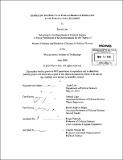Estimating the effects of foreign bribery legislation in the international economy
Author(s)
Lim, Kevin (Kevin Shun Wei)
DownloadFull printable version (8.896Mb)
Alternative title
Estimating the effects of anti-bribery legislation
Other Contributors
Massachusetts Institute of Technology. Dept. of Political Science.
Advisor
Gabriel Lenz.
Terms of use
Metadata
Show full item recordAbstract
Foreign bribery - the payment of bribes across borders - poses a classic collective action problem in theory. A firm may extract benefits through the payment of bribes to foreign public officials without its own country bearing the associated costs of governmental corruption, and hence while eliminating foreign bribery may be in the best interests of all who are engaged with the global economy, there are few obvious incentives for any one national government to be the first to take action. Over the last two decades, however, an unprecedented degree of multilateral cooperation on the issue of foreign bribery has been achieved. In particular, the Organization for Economic Cooperation and Development (OECD) has been a key institutional locus of activity, serving as the coordinating body for the monitoring and enforcement of a comprehensive anti-bribery convention that was adopted in 1997. This convention appears to have been largely successful at least in terms of spurring legislative change: all OECD member countries as well as several nonmember nations have since adopted laws that explicitly criminalize the act of bribing foreign public officials, and the capacity of the state to monitor, detect, and prosecute the offense of foreign bribery has ostensibly been enhanced. Given the potential for collective action problems to develop, it is thus important to ask whether the legislative action that has been taken thus far is meaningful in any measurable sense. I answer this question by constructing an original measure of the strictness of foreign bribery legislation, which I then employ as the main independent variable in an empirical study of export data, utilizing both difference-in-difference estimators and regression analysis. The results of my analysis provide support for the hypothesis that the enactment of stricter foreign bribery legislation amongst the countries party to the OECD convention has reduced exports to more corrupt countries more so than it has exports to less corrupt countries. These findings are robust to a variety of sensitivity tests, and I thus conclude that the OECD's multilateral anti-bribery initiatives have indeed had a meaningful impact on business decisions in the international economy.
Description
Thesis (S.M. and S.B.)--Massachusetts Institute of Technology, Dept. of Political Science, 2010. Cataloged from PDF version of thesis. Includes bibliographical references (p. 64-67).
Date issued
2010Department
Massachusetts Institute of Technology. Department of Political SciencePublisher
Massachusetts Institute of Technology
Keywords
Political Science.